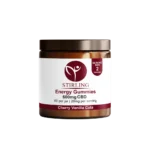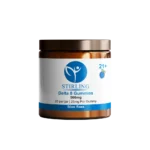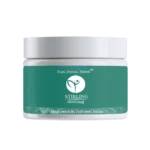There’s a buzz going through the cannabis industry, and the only thing people are talking about is Delta 8 THC!
There’s nothing like a new product to get the cannabis world talking, and it seems that everyone is talking about it lately. We know what you’re thinking, “We already know all about THC?” but that’s where you’re wrong!
Delta 8 THC is closely related to Delta 9 THC, the cannabinoid we’re all familiar with, but there are some fascinating differences.
In the following article, we’ll take a closer look at what it is, if it’s legal, how it’s different from Delta 9 THC, whether it will get you high, and what to look for when buying.
Known Potential Health Benefits of Delta 8 THC
Delta 8 can provide pain relief.
Delta 8 THC has received significant attention for its capacity to relieve pain. This claim is based on a survey in which 41% of therapeutic users claimed persistent pain as the reason for using it.
Delta 8 THC uses various mechanisms to relieve pain. For starters, it has shown the ability to reduce pain signals in the neurons and spinal cord directly. The direct regulation of the neurological system helps to alleviate discomfort.
Furthermore, Delta 8 THC interacts with immune cell receptors, decreasing inflammation associated with joint and muscle aches. By reducing swelling, it addresses a common source of pain and suffering.
Delta 8 THC also interacts with reward center receptors, which might reduce unpleasant experiences. This interaction in the brain’s reward system adds to Delta 8 THC’s overall pain-relieving effects.
While more research is needed to understand the mechanisms and potential long-term effects fully, reported experiences and survey data indicate that Delta 8 THC has promise as a compound for pain management. This may lead to a multifaceted approach to pain relief through its direct impact on nerve signaling, anti-swelling properties, and modulation of reward pathways.
Delta 8 can improve sleep quality.
Delta 8 THC is gaining popularity for its potential to improve sleep quality. Several users reported success in getting deep and restorative sleep.
One of the key reasons customers choose Delta 8 products for sleep is their relaxing properties. Delta 8 promotes restful evenings by reducing stress and overthinking, frequently leading to sleep problems.
Scientifically, Delta 8 interacts with neurotransmitters in the brain that are associated with stable sleep patterns. For example, it can improve the efficiency of melatonin and dopamine synthesis. Melatonin is an important hormone that regulates sleep-wake cycles, and Delta 8 effect on its production can lead to more coordinated and comfortable sleep. Furthermore, by adjusting dopamine, Delta 8 can reduce the likelihood of nightmares and promote a more pleasant sleep experience.
While individual reactions may differ, the reported experiences and neurochemical effects of Delta 8 point to its potential as a natural help for improved sleep quality. As with other sleep-related interventions, consumers need to study Delta 8 cautiously. They may consider speaking with healthcare specialists, especially if they have underlying sleep issues.
Delta 8 can calm an overactive immune system.
Delta 8 THC is emerging as a notable molecule due to its ability to treat an overactive immune system. Add to it Delta 8’s ability to deliver unique health advantages.
This lesser-known cannabinoid has received attention for its anti-inflammatory and neuroprotective characteristics. Such qualities suggest it could be useful in soothing a hyperactive neurological or immune system.
Delta 8 THC’s anti-inflammatory properties are very effective in modifying certain immune responses. Swelling is an important part of the immune system’s response to numerous stimuli, but when it becomes excessive, it can cause discomfort and other symptoms linked with specific medical diseases. The ability of Delta 8 THC to lower inflammation suggests a potential treatment while also encouraging a more balanced immune response.
Furthermore, Delta 8 THC’s neuroprotective qualities may explain its capacity to soothe a hyperactive immune system. The contact with the neurological system may help regulate immune response, reducing excessive reactions that could lead to health problems.
Delta 8 can stimulate appetite.
Scientific evidence states that Delta 8 THC can quicken a person’s dormant appetite. A study looking at the effects of Delta 8 THC on food consumption in mice found that it has the ability to enhance hunger.
In the study, test subjects who were given a low dose of Delta 8 THC showed a significant increase in food intake compared to the control group. The difference is a 16% increase in the short term and a 22% increase in the long run.
Interestingly, the study found that the group given Delta 8 THC ingested more food than the group given Delta 9 THC despite having identical performance in cognitive mazes and brain activity. This shows that Delta 8 may be more efficient at increasing hunger than its more well-known counterpart, Delta 9 THC.
These findings may have ramifications for people who suffer from eating disorders, have a general lack of appetite, or want to gain weight by increasing food intake and caloric consumption. Delta 8 THC’s potential to boost appetite may provide a practical answer for people who struggle with insufficient food intake.
How Does Delta 8 THC Work?
Delta 8 THC is a known structural isomer of Delta 9 THC (a main psychoactive compound naturally occurring in a hemp plant). The only difference in chemical structure would be the placement of a double bond between the two major cannabinoids. Even though this is a slight dissimilarity, it seems to influence their potency and effects.
The human body consists of a unique network of chemical signals and cellular receptors densely packed throughout the body. This is what we call the human endocannabinoid system or simply ECS.
Experts are still conducting studies to understand further how ECS works. So far, we discovered that ECS plays an essential role in regulating a range of bodily functions and processes, such as:
- Mood
- Sleep
- Appetite
- Pain
Findings from hemp and cannabis research studies propose that Delta 8 THC interacts with the same cannabinoid receptors as Delta 9 THC. This effect is explained by their almost identical chemical structures.
Preliminary studies suggest that Delta 8 THC binds to innate cannabinoid receptors of the body’s endocannabinoid system with lesser potency as compared with Delta 9 THC. This diminished binding strength results in a decrease in the psychoactive potency of the THC cannabinoid. This might explain why users commonly report that Delta 8 has milder psychoactive effects compared to standard THC.
While our understanding of Delta 8 THC’s mechanism of action is still in its early phases, we know that ongoing research aims to discover the intricacies that surround this intriguing hemp molecule. More research studies are necessary to comprehensively grasp how Delta 8 THC interacts with the endocannabinoid system.
Delta 8 THC Products You Can Buy Online
Delta 8 THC Gummies
These are edible products infused with Delta 8 THC. The gummies are popular among users since they provide a convenient and delectable way to enjoy Delta 8 THC. Also, the gummies are innovative on their own because Delta 8 THC products are typically manufactured via smokables.
Delta 8 THC gummies are available in various flavors, shapes, and concentrated amounts. This feature enables Delta 8 THC gummies to cater to different preferences and dosage requirements.
Delta 8 THC Oils
These are another kind of Delta 8 THC products that offer discretion and versatility, elements we all love when we buy Delta 8 products. Delta 8 THC oils contain Delta 8 extracts designed for consumption. Like the gummies, Delta 8 THC oils offer an alternative to traditional methods of Delta 8 intake (e.g., smoking or vaping).
Users can administer Delta 8 THC sublingually by placing drops under the tongue. This method allows for relatively fast absorption into the bloodstream, giving the user quick access to the experiential benefits of Delta 8 THC.
Delta 8 THC Capsules
These capsules contain a specific dosage of Delta 8 THC in each capsule. This quality makes Delta 8 capsules easy to manage. Users can also control their intake as they ingest these THC capsules.
Delta 8 capsules can be specifically beneficial for individuals who prefer precise dosing or want a discreet way to consume cannabinoids.
Delta 8 THC Topicals
Delta 8 THC topicals come in various forms, such as creams, balms, lotions, or salves. They are applied directly to the skin, wherein Delta 8 is absorbed locally through the skin’s surface. The localized application offers benefits (such as pain relief) without the systemic effects related to ingesting or inhaling cannabinoids.
Delta 8 THC Vape Cartridges
Delta 8 THC vape cartridges are products designed for inhalation that contain Delta 8 tetrahydrocannabinol, a cannabinoid found in the cannabis plant. These cartridges are intended for use with vaporization devices. These would include vape pens or vaporizers, providing a convenient and efficient way to inhale Delta 8 THC.
Stirling’s Bestselling Delta 8 THC Products
Delta 8 and Delta 9 Fusion Bliss Bites
These gummies stand out as a powerhouse in the expanding world of Delta 8 gummies. Stirling Delta 8 and Delta 9 Fusion Bliss Bites are equipped with the power of Delta 8 THC (150 mg), Delta 9 THC (12 mg), and THCP (1 mg). The tri-cannabinoid synergy offers a potent and balanced blend of hemp’s most renowned cannabinoids.
These edibles that are derived from the famous cannabis sativa plant deliver precision dosage, ensuring users can manage their intake effectively. The combination of Delta 8 THC, Delta 9 THC, and THCP is designed to provide maximum relaxation and a comprehensive cannabinoid experience.
Delta 8 Gummies for Sleep
Do you struggle to get sleep? Then, these gummies are waiting for you.
Each 50mg gummy provides 12.5mg of Delta 8 THC, 25mg of CBD, and 12.5mg of CBN derived from quality-grown organic hemp. The pectin-based gummies use beet sugar and tapioca syrup as sweeteners. Each jar contains 20 gummies.
Stirling’s Delta 8 Gummies for Sleep has Delta 8, CBD, and CBN. The edibles are prepared to be the most effective sleep solution. The gummies help you fall asleep faster and promote longer, more restful sleep, playing a vital role in improving overall health.
25 mg Delta 8 Gummies
Stirling offers these 25 mg Delta 8 gummies in three delicious flavors to choose from – Blue Razz, Mango, and Strawberry Watermelon. The gummies are the byproduct of quality hemp-derived delta 8 THC. With 20 gummies per jar and 25mg of delta 8 in each, these edibles provide a convenient way to enjoy the effects of this popular cannabinoid in precisely measured doses and tasty fruity flavors.
Delta 8 Gummies 100 mg
With such an incredibly high concentration of 100mg Delta 8 per gummy, these Delta 8 edibles deliver an intense, long-lasting experience. The precisely measured dosage allows users to easily control their delta 8 intake.
For those seeking maximum potency and a truly powerful Delta 8 experience, Stirling’s 100mg Delta 8 Gummies provide a heavy-hitting edible option from quality hemp-derived cannabinoids.
Delta 8 THC vs Delta 9 THC
Delta 8 and Delta 9 are two closely related isomers of tetrahydrocannabinol (THC), which is the primary psychoactive compound present in both hemp and cannabis plants. Although they are present in hemp extract, Delta 8 THC and Delta 9 THC hold distinct properties that set them apart.
Carbon Double Bond Positioning
(Image is for reference only. If possible, we generate our own? Thanks!)
- Delta 9 THC has a double bond on the 9th carbon atom in the molecular structure.
- Delta 8 THC has a double bond on the 8th carbon atom in the molecular structure.
This slight difference in the positioning of the carbon atoms’ double bond (as shown in the image above) leads to variations in their properties and effects.
Chemical Synthesis
Delta 9 THC is naturally occurring in cannabis plants, while Delta 8 is present in much smaller quantities.
Delta 8 THC is often synthesized from CBD (cannabidiol) through a chemical process that involves isomerization, where the positioning of the double bond is altered from the 9th to the 8th carbon.
Effects
Both Delta 8 and Delta 9 THC interact with the body’s endocannabinoid system in the body, producing psychoactive effects.
However, Delta 8 THC is often described as producing a milder “high,” meaning it produces less intense psychoactive effects and a more relaxed and clear-headed experience. Delta 9 THC is generally considered to be more potent and can produce stronger psychoactive effects.
Legal Status
The legal status of Delta 8 and Delta 9 THC varies depending on the jurisdiction.
In many places, Delta 9 THC is still illegal due to its classification as a controlled substance. Delta 8, on the other hand, exists in a legal gray area in some countries and states. This is especially true if the cannabinoid is derived from hemp and may not be explicitly prohibited in certain laws.
Frequently Asked Questions
Is Delta 8 THC legal?
Delta 8 THC, the nicer younger sibling of the psychoactive substance Delta 9, lies in a legal gray area. Delta 8 THC’s legality varies on the state laws. In states where Delta 8 is legal, it is often because it is derived from hemp, which was legalized under the 2018 Farm Bill (the Agriculture Improvement Act of 2018).
Is Delta 8 THC safe?
Products that are infused with Delta 8 are generally considered safe, making them effective means to enjoy the hemp’s potential benefits. Despite these potential benefits, the safety of Delta 8 THC may still be compromised if it has undergone compromised manufacturing processing.
How much THC is in Delta 8?
In general, Delta 8 THC products are made by extracting and isolating Delta 8 THC from hemp-derived CBD. The amount of Delta 8 THC in these products can range from a few milligrams to hundreds of milligrams per serving or product.
What is Delta 8 THC?
Delta 8 is a minor cannabinoid that is an isomer of Delta 9 THC. Also called D8, this cannabinoid has a slightly different molecular structure than Delta 9 THC but produces similar, though typically milder, psychoactive effects.
Does Delta 8 have THC?
Being an isomer of Delta 9 THC with a slightly different molecular structure, Delta 8 contains the tetrahydrocannabinol molecule.
Does Delta 8 THC get you high?
Yes, Delta 8 can produce a “high” typically associated with cannabis use. However, due to the slight difference in molecular structure, Delta 8 is generally considered to be less potent than Delta 9.
Does Delta 8 THC show up on a drug test?
Because Delta 8 is a THC metabolite, it may appear on standard drug tests. If you are subject to drug testing and are concerned about the potential implications of consuming Delta 8 you may consult a healthcare professional or legal expert. Your goal is to understand the specific testing policies and procedures that apply to your situation.
How long does Delta 8 THC stay in the human body?
The duration that Delta 8 remains in the human body can be affected by several factors. However, being an isomer of Delta 9, this cannabinoid generally follows a similar pattern to hemp’s primary psychoactive substance.
On average, Delta 8 THC and its metabolites can be detected in urine for up to 30 days for occasional users and up to 60-90 days for habitual consumers.
What are some potential adverse events related to Delta 8 THC products?
Below are some of the side effects that could result from consuming Delta 8 products. For many people, these are safety concerns:
- Dry mouth
- Stomach upset
- Fatigue
- Drowsiness
What is Delta 8 THC’s shelf life?
On average, Delta 8 products have a shelf life of 6 months to 1 year if stored properly. To experience such prolonged shelf life, you should use Delta 8 products following specific storage instructions.
What does the latest cannabis research say about Delta 8 THC?
We have relatively limited research studies on Delta 8. However, previous studies tell us about Delta 8’s potential benefits and possible side effects. Some research focused on the binding affinity of Delta 8 and how it affects the cannabinoid’s interaction with the human ECS.
Why is Delta 8 THC sometimes referred to as the “diet weed?”
The term “diet weed” that is typically associated with Delta 8 implies that D8 provides a more subdued or “lighter” version of the high associated with traditional cannabis products.
Can cannabis products contain Delta 8 THC?
Yes, some cannabis products can contain Delta 8, although it is generally present in much lower concentrations than Delta 9. Delta 8 THC is typically present at very low levels, often less than 1% of the total THC content. The majority of the psychoactive effects in these products are attributed to the higher concentrations of Delta 9 THC.
What is the importance of third-party lab tests?
Third-party lab tests play a crucial role in ensuring the safety and quality of CBD products, particularly regarding the presence of heavy metals and other contaminants.
Is Delta 8 THC safe?
Delta-8 THC, a cannabis derivative growing in popularity, sparks concerns from public health officials who oversee community health. While potentially legal, it exists outside the regulations of controlled substances like alcohol and recreational cannabis. This lack of oversight raises concerns about product quality and safety.
National poison control centers report a rise in cases linked to Delta-8 THC, highlighting potential dangers, especially for young consumers. The long-term health effects of this novel compound remain unknown, urging public health experts to call for clearer regulations, standardized testing, and public education campaigns to safeguard consumer well-being. It’s crucial to consult healthcare professionals before using Delta-8 THC products, especially if you have underlying health conditions or take medications. (Source: Drug Alcohol Rev. 2016;35:326–33. Article Google Scholar Marlatt GA, Larimer ME, Witkiewitz K. Harm reduction)























